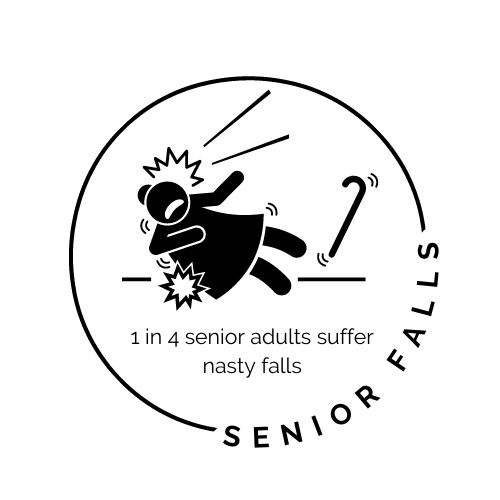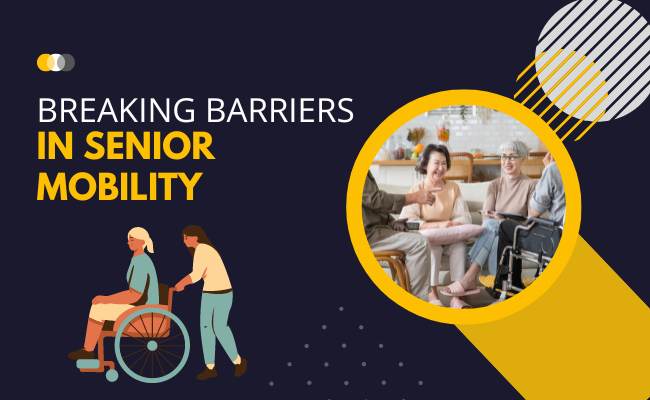When it comes to senior care, falls are a major dealbreaker – and for a good reason. Studies show that when older folks go down, the impact can be catastrophic, not only physically but emotionally too! Looking into this topic is essential to ensure our most beloved elders stay safe in their golden years.
 Falls occur every year in about one in four individuals aged 65 or over–a figure that increases to two in three for those who have already had a fall. The injuries caused by a fall are often severe and may result in long-term disability or even premature mortality.
Falls occur every year in about one in four individuals aged 65 or over–a figure that increases to two in three for those who have already had a fall. The injuries caused by a fall are often severe and may result in long-term disability or even premature mortality.
What Causes the Elderly to Fall?
It’s not just in their own homes that elderly persons are at risk for dangerous falls. Seniors fall in public places and in nursing facilities, too. Many elderly people don’t see as well as younger adults and may not move as quickly as they once did or with the same agility.
Complications of old age are often compounded by stroke, disease, or some other physical ailment. Sometimes persons advanced in age get confused about where they are; as a result of anxiety, many seniors are not as careful moving about the surrounding area – even familiar places. Common reasons elderly persons fall:
- Lack of sleep due to living conditions, health issues, or insomnia.
- Walking in unfamiliar territory.
- Walking over uneven terrains such as a hillside or poorly lit area.
- Walking on slippery floor surfaces such as in the bathroom or slipping in the kitchen.
- Using area rugs that are not skid-resistant.
- Tripping over pets.
- Inability to navigate around small children and/or toys.
- Moving too fast or moving suddenly.
- Distractions.
- Medications.
- Poor eyesight.
- Poor walking gait. Stiff muscles and sore joints impair a smooth walking rhythm.
- Poor balance due to the aging process or some other reason.
- Compromised coordination due to many deteriorating health conditions, including mental disorders, physical disease, and/or obesity.
How Ramps Can Help
Wheelchair ramps can prevent nasty falls in the elderly by providing a safer and more accessible environment. Ramps help people with mobility impairments, such as the elderly, to easily and safely access buildings, homes, and other areas that may have steps or obstacles. With a ramp in place, the risk of falls is greatly reduced as it eliminates the need for the elderly to navigate steps, which can be difficult or dangerous for those with limited mobility. Additionally, ramps often have slip-resistant surfaces and handrails, which provide added stability and support for those using a wheelchair or mobility aid.
 It’s important to note that not all ramps are created equal, and it’s important to choose a ramp designed to meet the specific needs of the elderly. Some factors to consider are the slope of the ramp, the length of the ramp, and the type of surface — all of these can easily be estimated using a slope incline calculator. Metal ramps are more durable, and aluminum ramps, particularly, are suited for outdoors because they are rust=resistant. An experienced rehabilitation specialist can help determine the best ramp solution for a particular individual.
It’s important to note that not all ramps are created equal, and it’s important to choose a ramp designed to meet the specific needs of the elderly. Some factors to consider are the slope of the ramp, the length of the ramp, and the type of surface — all of these can easily be estimated using a slope incline calculator. Metal ramps are more durable, and aluminum ramps, particularly, are suited for outdoors because they are rust=resistant. An experienced rehabilitation specialist can help determine the best ramp solution for a particular individual.
Preventing Falls in Older People
Educating seniors about the causes of falling before a falling incident occurs is the best prevention against falling accidents. Informing concerned caregivers of potential risks around the home and in the environment may help the elderly resident avoid falls. Reviewing medications and treating problematic sleep situations in elderly persons may help reduce the risk of falling accidents. The use of walking aids and therapeutic intervention may decrease falling hazards, as well.
Elderly persons can fall for many reasons; some causes are more obvious than others. Older people often need to be more mindful or be inattentive to dangers in the home. Inadequate housing can increase the probability of falling for an elderly resident. Poor sleep habits can impede physical and mental functions, which in turn can cause falling accidents among seniors. The best defense against dangerous falls is education, attention to surroundings, and careful monitoring of health conditions that may impair physical function.
